AA Explained: How the Program and the 12 Steps Help
The 12 steps of recovery have been around since 1939. Two men who struggled with alcohol use disorder had exhausted all efforts to stop drinking. They sat down and wrote 12 steps on how they would help themselves (and each other) recover from alcoholism. This began the fellowship of Alcoholics Anonymous (AA). The 12 steps of recovery are the foundation of their fellowship, and they have been expanded to apply to Narcotics Anonymous (NA) as well.
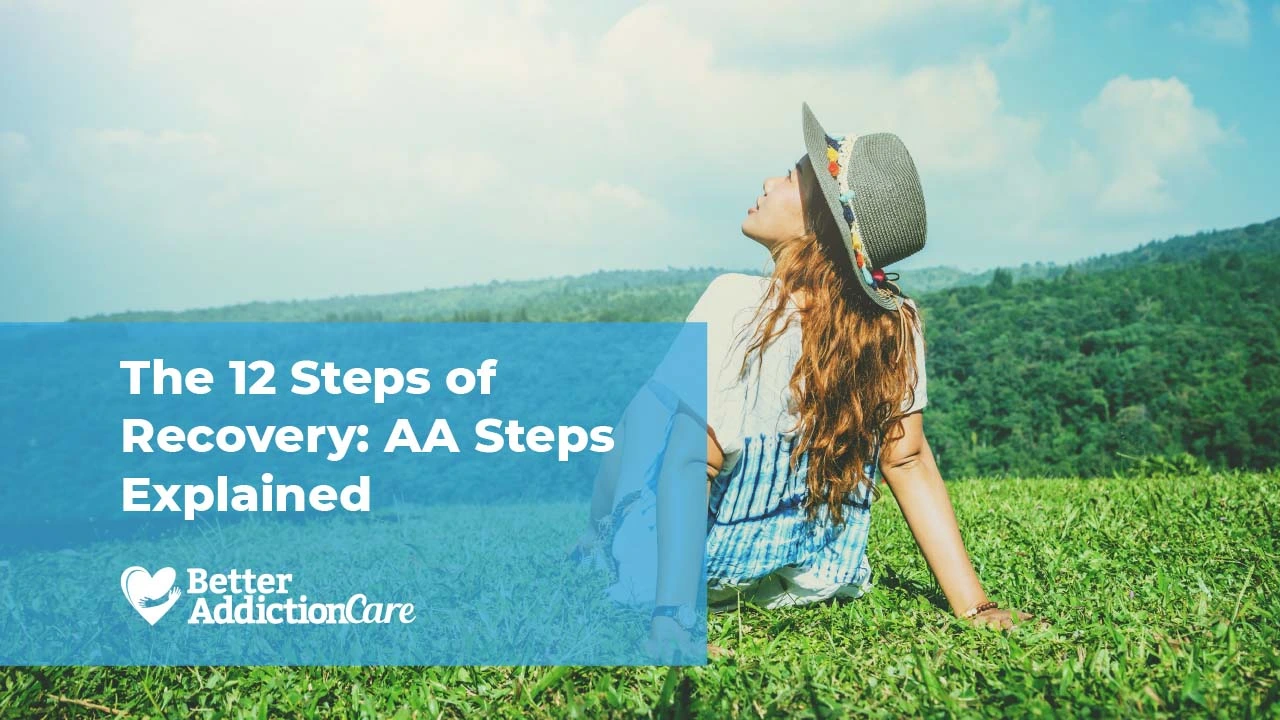
Better Addiction Care is made up of a team of experts in the field of addiction treatment as providers of resources for finding the proper help and knowing the 12 steps in and out. In this guide, you will find the 12 steps of AA explained. We will also review the ways that it can benefit your own struggles, just as it has the others who make up the ranks of the AA recovery rate.
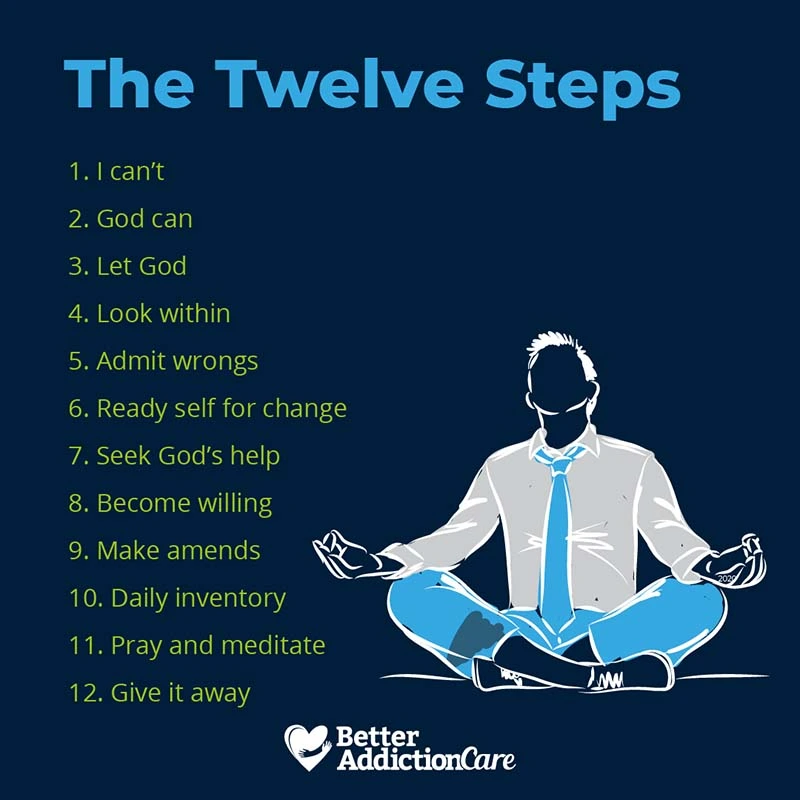
The 12 Steps Explained
When trying to have the steps for AA explained, it is often common knowledge that the first step in recovery is to admit one’s own struggles and compulsion to drink alcohol. Although this is just the barrier to entry into the 12 AA steps list, admitting you have a problem is often the most difficult of steps. Once you have had the first step to getting sober completed, the rest will seem like a natural progression.
These are all 12 AA steps explained:
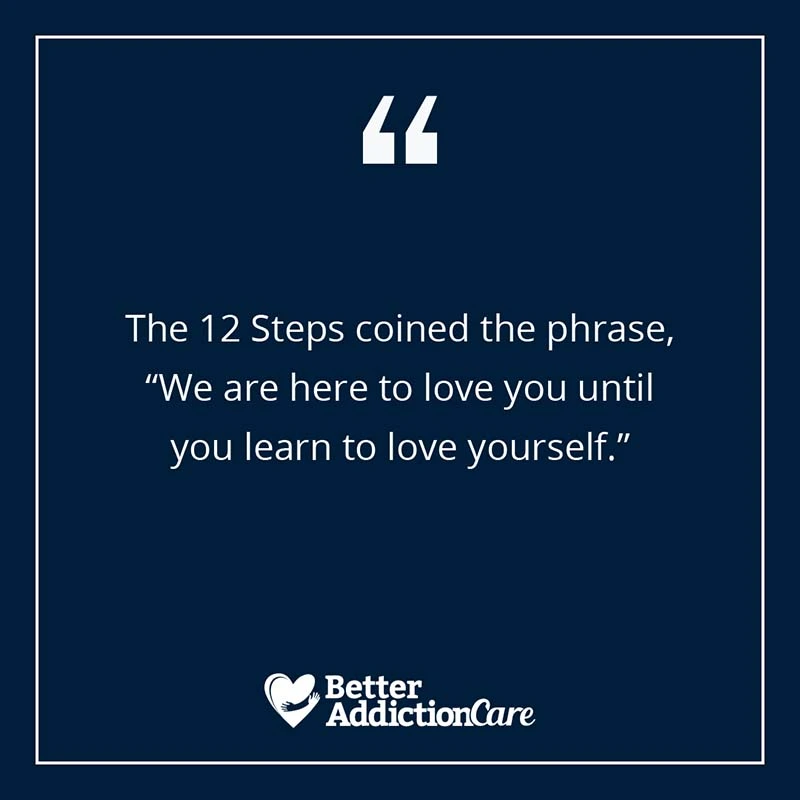
Step 1: Admitted You Are Powerless in Your Struggle With Alcohol
“We admitted we were powerless over alcohol—that our lives had become unmanageable.”
The first step in recovering is admitting your issue with alcohol abuse. This is often the most important step of your recovery and can be the most difficult to tackle. In this step, you admit you cannot control your alcohol addiction and that things are out of control as a result. You embrace the fact that you need help in changing your life.
Some helpful tips for Step 1 of AA include:
- Avoid using drugs or alcohol.
- Practice modesty and humility and let go of your pride.
Step 2: Came to Believe a Power Greater Than Ourselves
"Came to believe that a Power greater than ourselves could restore us to sanity.”
This is about believing that even though you are powerless, there is a source of strength you can tap into—whether this is God, another Higher Power of your choosing, or the group.
Some tips for Step 2 of recovery include:
- Make sure to choose a Higher Power you believe in. It can be nature, science, music, or yourself.
- Reach out to other AA members to hear about their experiences and what Higher Power they chose.
- Accept your thoughts and feelings.
Step 3: Decided to Turn Our Will and Our Lives Over
“Made a decision to turn our will and our lives over to the care of God as we understood Him.”
In this step, you are ready to surrender to that power of your understanding. This will help you remove the selfishness of your addiction and turn it over.
Some things to remember for Step 3 include:
- Keep a positive attitude.
- Be open to guidance from others in AA.
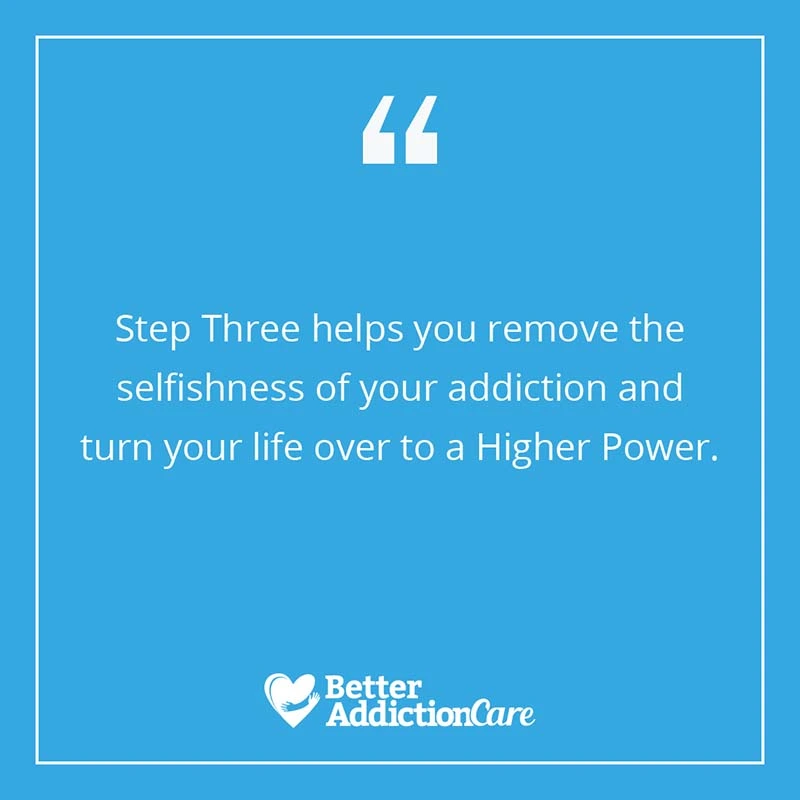
Step 4: Made a Searching and Fearless Moral Inventory
“Made a searching and fearless moral inventory of ourselves.”
Step 4 of recovery is the first step in which you turn your desires and commitments into action. You address your part in your alcohol addiction, including your emotional problems and moral defects.
How to complete Step 4 of recovery:
- Be honest about your moral defects and problems.
- Accept that you and you alone are responsible for your alcoholism.
- Work with your sponsor and challenge yourself to be as transparent as possible.
Step 5: Admitted the Exact Nature of Our Wrongs
“Admitted to God, to ourselves, and to another human being the exact nature of our wrongs.”
Step 5 is when you take your list from Step 4 and share it with your sponsor or another member of the program. This may sound intimidating, but once you do it, you’ll realize how freeing it can be.
Here’s how to get the most out of Step 5 of 12 for AA explained:
- Let go of your fear of judgment. Your sponsor or a fellow member is there to accept you as you are.
- Make sure you choose someone you feel wholly comfortable with.
- As with Step 4, make sure you are as honest as possible.
- Embrace vulnerability.
- Accept advice and feedback with an open heart and mind.
- Remember that AA is a safe space for you to express yourself and your weaknesses.
Step 6: Were Ready to Have God Remove All Defects of Character
“Were entirely ready to have God remove all these defects of character.”
This step is about the willingness to not only acknowledge and admit your shortcomings but to make a change in your life as well.
Some helpful tips for Step 6 include:
- Rely on your Higher Power to help remove your moral defects.
- Acknowledge and accept that alcohol addiction recovery is a lifelong process.
- Let go of the desire for perfection.
- Try to stay positive throughout this process, however distressing it can be.
- Remember that you’re a work in progress, and you should celebrate small successes.
Step 7: Humbly Asked Him to Remove Our Shortcomings
“Humbly ask Him to remove our shortcomings.”
In Step 7, you now turn to your Higher Power and ask for help to remove the character defects that keep you stuck in your alcohol addiction.
Things to remember for Step 7 of recovery:
- Stop relying on yourself and begin to rely on your Higher Power.
- Begin to practice modesty and humility.
- Prioritize improving your character ahead of your emotional comfort.
- Shift from a self-centered approach to a selfless one.
- Be patient. Positive and lasting changes take time.
- Be open to feeling the pain you masked with alcohol.
Step 8: Made a List of Persons We Had Harmed
“Made a list of all the persons we had harmed and became willing to make amends to all of them.”
In Step 8, you begin to think about those in your life who your alcoholism has affected. Also, you prepare yourself to make amends.
Some reminders for Step 8 include:
- Make a list of everyone you’ve hurt and how you’ve hurt them, as AA explained before in the previous steps. Be as honest with yourself as possible.
- Avoid blaming others for how they’ve treated you.
- Focus on yourself and what you can control about yourself.
- Recognize how you’ve also harmed yourself with your drinking.
- Dig deeper into your flaws.
Step 9: Made Direct Amends Whenever Possible
“Made direct amends to such people wherever possible, except when to do so would injure them or others.”
Now is the time to make amends for your past actions. This step can be difficult; however, it is a vital step in your recovery. Remember, amends aren’t about simply saying you’re sorry—it’s about changing your behavior.
Some helpful tips for Step 9 of recovery include:
- Use good judgment. Don’t attempt to reconnect with someone who may be triggered by you.
- Be mindful of timing and what you disclose. Sometimes, sharing can cause more harm than good.
- Take your time making amends with others.
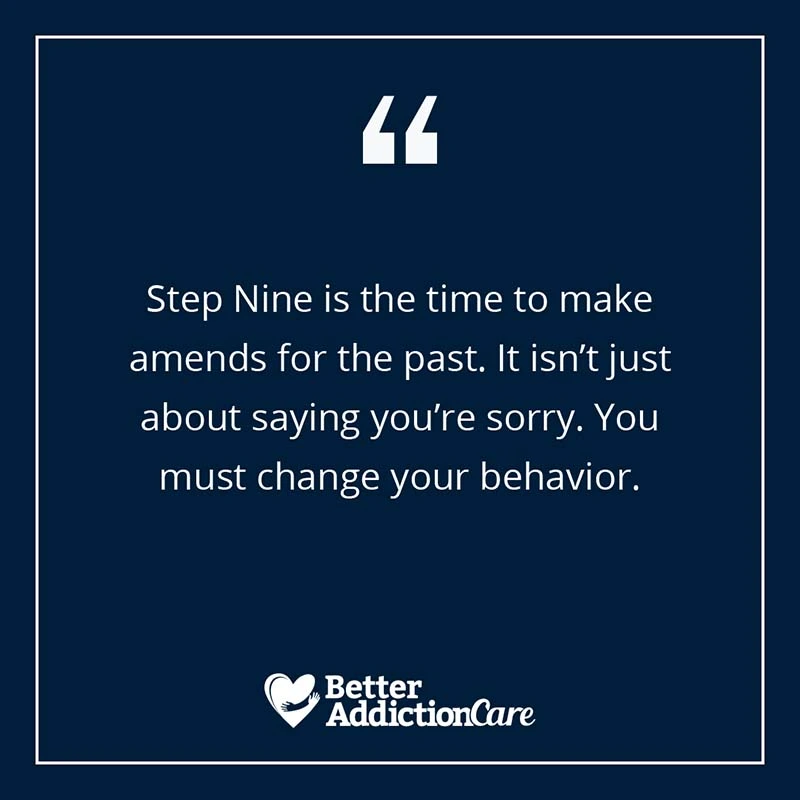
Step 10: Continued to Take Personal Inventory
“Continued to take personal inventory and when we were wrong promptly admitted it.”
This step is the first in the maintenance steps. You take time out of each day to review your behavior and make amends where necessary. This step also allows you to see what you have done well.
Strategies for Step 10 include:
- Learn to take a step back and breathe before reacting.
- Practice self-examination on a daily basis.
- Admit when you are wrong and take responsibility for your actions.
- Forgive others readily.
- Focus on the big picture. Nobody is perfect, so it’s normal to make mistakes.
Step 11: Sought Through Prayer and Meditation to Improve Our Conscious Contact With God
“Sought through prayer and meditation to improve our conscious contact with God as we understood Him, praying only for knowledge of His will for us and the power to carry that out.”
As part of AA and the 12 Steps of recovery, it is essential to remain in contact with your Higher Power through prayer and medication. This step reminds you of just that.
Reminders for Step 11:
- Choose your preferred spiritual activity. This could be prayer, meditation, or something else that connects you to your Higher Power.
- Focus on your Higher Power’s desire for you and your life of sobriety.
- Cultivate a serene and relaxing environment.
Step 12: We Tried to Carry This Message to Alcoholics and to Practice These Principles
“Having had a spiritual awakening as the result of these steps, we tried to carry this message to alcoholics and to practice these principles in all our affairs.”
Now, having found your spiritual connection, you are ready to carry the message to others and practice these steps in all areas of your life.
Tips and tricks for Step 12 of recovery:
- Reach out to fellow alcoholics who are not yet in recovery and offer support and guidance.
- Make sure to practice all 12 steps regularly.
- Lead with love, positivity, and humility in both your approach to helping yourself and others.
- Shift your perspective so you can transform your weaknesses or defects into strengths.
- Prioritize your spiritual growth.
With these 12 steps of AA explained to completion and with some helpful tips to accompany each one of them, you should now know what to expect. Each step of the recovery process is important. Remember that getting sober should feel like a process and not a fix – this is important for the program’s success and your own sobriety. But just how effective are these steps in treating the alcoholism that has plagued you and so many others? And if it is successful, what can you expect to change in your life that will be noticeable and impactful?
Benefits and Effectiveness of Alcohol 12 Steps Explained
When having the 12 steps of AA explained to you, it can be natural to wonder if there will be successes along the journey and if the experience and newfound lifestyle of sobriety will change your life. And if it is successful in helping you reach sobriety, why should it remain a part of your life?
Though it is very hard to put an actual percentage down on the number of people who have found their lives changed thanks to the program, the most important thing to take away from AA is that the program has a high success rate. Remember, someone who is undergoing the program’s steps should look inward and not toward others.
Reaching conclusions about your own need for help is emphasized from the very beginning. What you will find, regardless of how far along your recovery journey you are, is that people who have already completed all 12 steps can be found returning to meetings years past the start of their own sobriety. This is not just because they wish to help others, which many do. It is also because, as AA explained during the process of completing these steps, this is a lifelong change that should be constantly enforced.
Many times, some professional help will be needed for AA to be successful, and if you’re having trouble finding a team in your area that you believe to be perfect, that’s when our team comes into play.
When having the 12 steps of AA explained to you, it can be natural to wonder if there will be successes along the journey and if the experience and newfound lifestyle of sobriety will change your life. And if it is successful in helping you reach sobriety, why should it remain a part of your life?
Though it is very hard to put an actual percentage down on the number of people who have found their lives changed thanks to the program, the most important thing to take away from AA is that the program has a high success rate. Remember, someone who is undergoing the program’s steps should look inward and not toward others.
Reaching conclusions about your own need for help is emphasized from the very beginning. What you will find, regardless of how far along your recovery journey you are, is that people who have already completed all 12 steps can be found returning to meetings years past the start of their own sobriety. This is not just because they wish to help others, which many do. It is also because, as AA explained during the process of completing these steps, this is a lifelong change that should be constantly enforced.
Many times, some professional help will be needed for AA to be successful, and if you’re having trouble finding a team in your area that you believe to be perfect, that’s when our team comes into play.
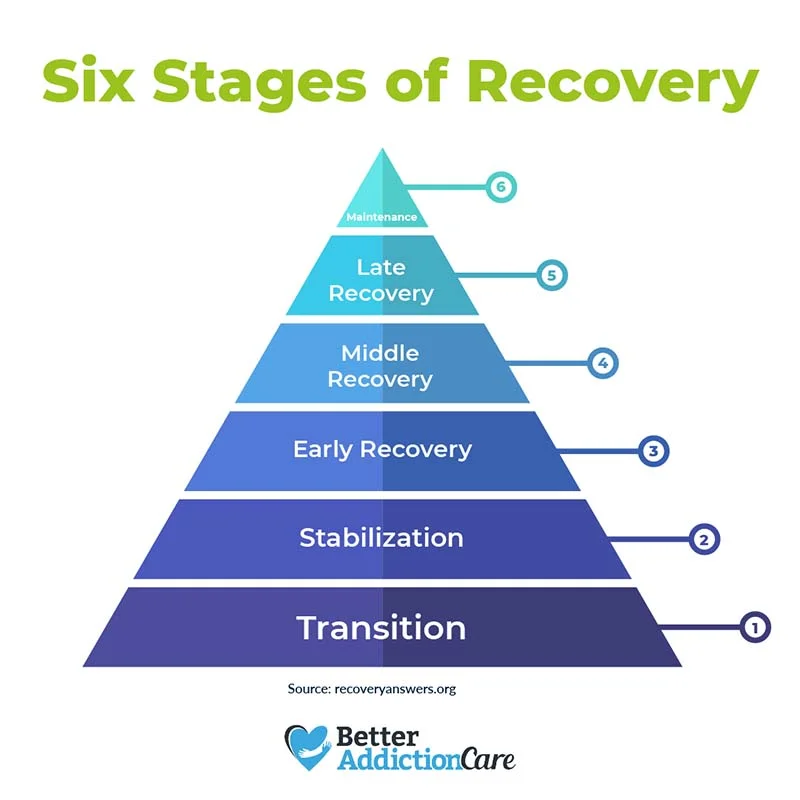
How to Get Sober by Finding the Right Treatment Center
Are you in need of assistance apart from just having the 12 steps for AA explained? Do you want to start your recovery journey but do not know which professional treatment care providers would be perfect for you? If so, then be sure to consult the team at Better Addiction Care and let them find the best fit for you in your area.
Our resources are completely free and exist only to help you find the place you wish to be on the stage for your recovery journey. Get in touch with our team today to learn more about our resources, or read some of our other articles to get further insights into all things related to substance abuse, mental health, and dual diagnosis treatment centers.
Your recovery is just around the corner. The first step is to get started and do your research.







